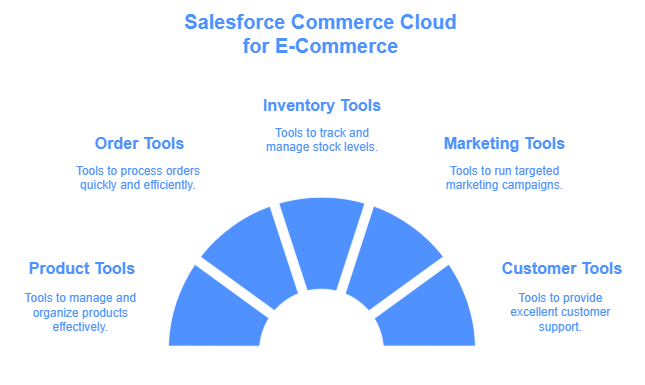Salesforce integration offers e-commerce businesses a powerful way to enhance customer experiences and streamline operations.
By connecting Salesforce with e-commerce platforms, companies can create a unified view of customer data, enabling personalized interactions and efficient order management.
This integration improves marketing efforts and facilitates real-time insights that help businesses adapt to changing consumer needs and preferences.
From leveraging Salesforce Commerce Cloud to utilizing third-party applications, these strategies can optimize workflows, boost sales, and drive growth.
What is Salesforce E-Commerce Integration?
Before we proceed, it’s important to introduce the Salesforce Sales Cloud and it’s e-commerce integration potential.
Understanding Salesforce Sales Cloud and E-Commerce
The Salesforce Sales Cloud is Salesforce’s CRM tool helping businesses manage and improve sales process across the board.
From lead generation to customer retention, the Sales Cloud offers a centralized customer data repository that helps sales team forecast sales, track customer interactions, and personalize outreach.
Use cases for integrating Salesforce Sales Cloud with e-commerce platforms include improving customer insights and personalizing marketing efforts.
Benefits of Integrating Salesforce with E-Commerce Platforms
The benefits of integrating Salesforce with e-commerce platforms includes:
- A unified customer view to ain a complete understanding of customer behavior across all channels, including online and offline interactions.
- Developing personalized experiences with tailored marketing campaigns and customer service based on individual preferences and purchase history.
- Improving customer service by providing faster and more efficient support by accessing customer information from a single platform.
- Increasing sales by using customer data to identify cross-selling and upselling opportunities.
- Smoothening operations by automating tasks such as order processing, inventory management, and shipping.
- Improving marketing by running targeted campaigns based on customer segmentation and purchase behavior.
- Better Decision Making by gaining important insights into customer trends and market dynamics.
When considering these benefits, businesses should also evaluate Salesforce pricing to ensure it aligns with their budget and long-term objectives.
Popular Salesforce Integrations for E-Commerce
The Salesforce CRM and Sales Cloud are modular tools that e-commerce companies can use to improve various aspects of their business.
However, third-party e-commerce integrations take an already powerful platform and add more value and capability to it.
The most popular Salesforce integrations for e-commerce include:
Subscription Management with Recurrex
Businesses use Recurrex to manage their recurring revenue streams, improve customer retention, and automate billing.
The benefits of using Recurrex with Salesforce include:
- Improving the subscription management workflows, automating an essential but boring job.
- Reducing churn and building better company-customer relationships
- Improving revenue potential and numbers based on strong business principles
- Significantly improving the customer experience, helping the business grow.
Salesforce and Magento Integration
Magento is the premier B2B e-commerce platform used by companies all over the world to sell to companies.
Connecting Magento with Salesforce combines two powerful platforms to improve order management, customer experience and relationship management, and inventory management.
Magento’s personalization and Salesforce’s modularity make for an extremely powerful business tool that can improve any B2B business using it.
The benefits of a Salesforce-Magento integration include:
- The company has a unified view of essential customer data, necessary to run the business.
- A Salesforce-Magento integrations helps improve order fulfillment and improves the customer experience.
- The company can deliver better customer service using updated essential data and quick access to whatever is needed.
- Readily available customer data helps marketing teams craft more targetted campaigns that get to exactly where it needs to go.
A Salesforce-Magento integration can significantly improve the business, combining two highly customizable platforms together. For seamless integration, hiring a CRM developer can ensure that all systems work together efficiently.
E-Commerce Integration
byu/sudojojo insalesforce
Accepting Mobile Payments with Blackthorn
Mobile payments make up the lions share of e-commerce transactions and need a reliable, impenetrable payment solution.
A Salesforce-Blackthorn integratiions helps the business accept payments within Salesforce to make it easier for customers to pay on the go.
Every e-commerce company needs to streamline their payment process to have as little friction as possible and get the job done with the fewest number of pages.
The benefits of a Salesforce-Blackthorn integration include:
- Increased sales thanks to a reliable payment processor that gets the job done as and when it is required.
- Customer enjoy a more convenient checkout process with little friction and smooth purchasing.
- Blackthorn’s low processing fees help the business make more money per sale and helping the bottom line.
Email Marketing and Automation with BridgeMail
Despite the different marketing types that have emerged recently, email marketing continues to be the most popular method in the world.
Billions of emails are sent daily and e-commerce companies can benefit from this volume using the BridgeMail tool.
BridgeMail integrates with Salesforce to help marketing department create personalized marketing campaigns that help improve user engagement and in turn, the ROI a company can generate.
Automation is key for email marketing and BridgeMail has the tools required to help marketers improve their personalized email campaigns.
Tracking Analytics with Daddy Analytics
Analytics are essential tools that every business uses to understand their customer, gauge business performance, and find out whether initiatives are performing as expected.
Using Daddy Analytics helps e-commerce business with advanced analytics and reporting tools that grant deeper insights into the target customer.
Real world data analytics helps companies improve their decision making, i.e., picking initiatives with a high chance of success and help to improve sales and revenue numbers.
Salesforce Commerce Cloud vs Third-Party Integrations
E-commerce companies have two options to pick: the Salesforce Commerce Cloud and third-party integrations.
Both are proven ways to improve the business, each with unique advantages and disadvantages, depending on business needs and goals.
Overview of Salesforce Commerce Cloud for E-Commerce
The Salesforce Commerce Cloud is a one-stop, comprehensive solutions with various features and functions to benefit e-commerce businesses.
The features of Salesforce Commerce Cloud for e-commerce include:
- Product catalog management tools to create, manage, and organize your product catalog with ease.
- Order management tools that help process orders efficiently and accurately.
- Inventory management tools to track inventory levels and manage stock across multiple locations.
- Marketing and personalization tools to create targeted campaigns and personalize the customer experience.
- Customer service tools to provide excellent customer support through various channels.
- Analytics and reporting tools that help gain valuable insights into customer behavior and business performance.
- Scalability and flexibility tools that make it easier to scale your e-commerce operations as your business grows
What does this look like compared to third-part integrations?
Third-Party Integration Solutions for E-Commerce
Salesforce’s modularity has support third-part integrations for a while and several businesses have benefited from its modularity.
Third-party integrations into Salesforce help connect an existing e-commerce platform such as Shopify, Magento, or BigCommerce and allowing you to combine it with Salesforce’s now iconic tools.
Whether it’s the Salesforce CRM, Sales Cloud, or Marketing Cloud, integrating it with an e-commerce platform helps the business offload various essential responsibilities to a powerful system.
Choosing the Right Solution for Your Business Needs
Picking between a Salesforce e-commerce integration and third-party integration comes down to what the company needs.
The main factors contributing to your decision should include:
- The budget for Salesforce Commerce Cloud since it can be a significant investment, while third-party integrations may be more affordable.
- Consulting services can help evaluate and identify the best approach tailored to your business goals, ensuring seamless integration and maximum efficiency.
- Technical expertise for Salesforce Commerce Cloud to implement and maintain, while third-party integrations may be easier to set up and manage.
- Consider scalability with Salesforce Commerce Cloud because it is designed for large enterprises and can easily scale to meet growing demands.
- Salesforce Commerce Cloud offers extensive customization options, while third-party integrations may have limited customization capabilities.
Conclusion
Integrating Salesforce with e-commerce platforms transforms how businesses interact with customers, enhancing both operational efficiency and user experience.
By consolidating customer data, companies can create personalized shopping journeys that resonate with individual preferences.
This integration streamlines processes such as order management and inventory tracking, allowing teams to focus on strategic initiatives that drive growth and engagement.
An integration expert can help businesses maximize the potential of Salesforce by ensuring seamless connectivity and efficient workflows between platforms.
As e-commerce continues to evolve, leveraging Salesforce integration becomes essential for staying competitive.
The ability to access real-time insights empowers businesses to adapt quickly to market trends and customer behaviors.
Ultimately, integrating Salesforce not only improves customer satisfaction but also positions companies for sustainable success in a rapidly changing digital landscape.
FAQs
Why is Salesforce integration important for e-commerce businesses?
A Salesforce integration helps businesses with a single, unified access to essential data used to improve products, customer service, and marketing. The company can learn what works and what doesn’t, fix what needs fixing and learn from what went wrong.
What are the differences between Sales Cloud and Commerce Cloud?
Sales Cloud focuses on managing customer relationships and sales processes, providing tools for lead management, opportunity tracking, and sales forecasting.
Commerce Cloud is specifically designed for e-commerce operations, offering features for managing online storefronts, product catalogs, and customer experiences.
While Sales Cloud enhances sales team productivity, Commerce Cloud optimizes the shopping experience and integrates seamlessly with various sales channels.
Can microservices improve Salesforce E-Commerce integration?
Yes, microservices can significantly enhance Salesforce E-Commerce integration by allowing businesses to build flexible and scalable applications.

Navaid Ahmed
Director Of Engineering at Folio3 Software | Head of Product Management
Navaid Ahmed is a Seasoned Salesforce CRM expert, who brings a wealth of experience in optimizing sales processes, enhancing customer relationships, and driving business growth. With a deep understanding of Salesforce's capabilities, Navaid specialize in crafting tailored solutions that empower organizations to streamline operations, boost productivity, and achieve their sales objectives.

